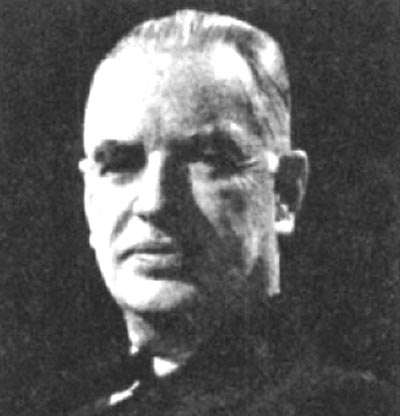
(1895-1958)
When the Canadian Anaesthetists' Society was founded in 1943, one of the two vice-presidents was Dr Roméo Rochette (the other was Dr Wesley Bourne). A native of Napierville, Quebec, Rochette, like his father and grandfather before him, chose medicine as a career, graduating in medicine at the Université de Montreal in 1922. He interned at the Hotel-Dieu, holding the post of chief intern from 1924 to 1926. He learned to give anaesthetics while he was an intern – there were no residencies in anaesthesia in those days – and in 1926 he was appointed Assistant in Anaesthesia. He remained at the Hotel-Dieu for the rest of his career, serving as head of the department from 1934 until his death on December 12, 1958, at the age of 63.
Such are the bare outlines of Rochette's career; they give no idea of his contributions to Canadian anaesthesia or of his personality. As an anaesthetist, by the time the Society was founded he had accumulated a wealth of experience and he kept himself au courant with modern knowledge and techniques. As an individual, he was ethically and morally above reproach, inherently distinguished and by upbringing a cultured man. The photograph by which we remember him is the portrait of a man who, while refined and reserved, was trustworthy and reliable. His advice was always listened to, and in the Society's formative years his counsel was much valued. He served the Society well as vice-president from 1943, when it was founded, to 1946.
In the late 1940s and the 1950s the Montreal scene was one of harmony, friendliness and cooperation, all of which fostered the serious interest in and concern for organized anaesthesia in Canada that the founders of the Society had in full measure. In that environment, with Rochette and Georges Cousineau among francophones and with Harold Griffith, Wesley Bourne and Digby Leigh among anglophones at the helm, the prospects for a national society, despite the clouds of war, looked good. These five individuals each brought their own strengths to bear on the task of nurturing the new Society. Rochette's were those of thoughtfulness as a colleague and of integrity as a physician; he inspired confidence in all who knew him and his counsel was greatly respected. In the Society's formative years these attributes were essential. Reserved and dignified, he gave much to the affairs of the Society, and what he gave during this period of growth was essential and invaluable.
David A.E. Shephard MB FRCPC, Charlottetown, PEI
CAN J ANAESTH 1992 / 39:3 / p299